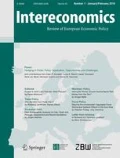Abstract
The adjustment crisis of the oil-importing developing countries has raised the question as to the specific roles of the IMF and the World Bank in the process of structural adjustment and the actual relationship between their different concepts and programmes. What are the areas of cooperation and conflict between these two institutions and what must alternative concepts for structural adjustment and conditionality take into consideration?
Similar content being viewed by others
References
M. Guitian: Fund Conditionality. Evolution of Principles and Practices, Pamphlet Series No. 38, International Monetary Fund, Washington D. C. 1981, p. 17.
Ibid., p. 19.
Ibid., p. 26f.
On the collaboration between the IMF and the World Bank see M. Guitian, op. cit.,, p. 27; and on the evolution of collaboration, Joseph Gold: The Relationship Between the International Monetary Fund and the World Bank, in: Creighton Law Review, Vol. 15, 1981–1982, No. 2, pp. 499–521.
See S. Dell: Conceptions and Misconceptions of Adjustment, New York, February 1984, pp. 11–16; and S. Dell: Statement to the Santiago Roundtable on World Monetary, Financial and Human Resource Development Issues, February 1984.
See K. Wohlmuth: Konditionierte externe Entwicklungsfinan-zierung und interne Strukturanpassung in den Entwicklungsländern, in: U. E. Simonis (ed.): Entwicklungsländer in der Finanzkrise, Berlin 1983, p. 182.
This approach has also been referred to as the Polak model. A critical evaluation is given in: K. Wohlmuth, op. cit., Konditionierte externe Entwicklungsfinanzierung und interne Strukturanpassung in den Entwicklungsländern, in: U. E. Simonis (ed.): Entwicklungsländer in der Finanzkrise, Berlin 1983, pp. 203–208.
A reference to this IMF staff attitude is given in S. Dell: Stabilization: The Political Economy of Overkill, in: World Development, Vol. 10, No. 8, 1982, p. 608, quoting an earlier analysis by T. Killick.
See T. Killick et al.: The IMF: Case for a Change in Emphasis, in: R. E. Feinberg, V. Kallab (eds.): Adjustment Crisis in the Third World, Overseas Development Council, Washington, D. C., 1984.
See S. Dell, R. Lawrence: The Balance of Payments Adjustment Process in Developing Countries, New York 1980; K. Wohlmuth, op. cit., Konditionierte externe Entwicklungsfinan-zierung und interne Strukturanpassug in den Entwicklungsländern, in: U. E. Simonis (ed.): Entwicklungsländer in der Finanzkrise, Berlin 1983, pp. 196–199.
K. Nashashibi: A Supply Framework for Exchange Reform in Developing Countries: The Experience of Sudan, pp. 24–79, in: IMF Staff Papers, Vol. 27, No. 1, March 1980.
This factor has been analysed by Joan M. Nelson: The Politics of Stabilization, pp. 99–118, in: R. E. Feinberg, V. Kallab (eds.), op. cit..
The basic literature on the Structural Adjustment Loans is: E. Stern: World Bank Financing of Structural Adjustment, in: John Williiamson (ed.): IMF Conditionality, Washington, D. C., Institute for international Economics, 1983, pp. 87–107; a more recent article is by Stanley Please: The World Bank: Lending for Structural Adjustment, in: R. E. Feinberg, V. Kallab (eds.), op. cit. Adjustment Crisis in the Third World, Overseas Development Council, Washington, D. C., 1984.
See S. Please, op. cit.,. p. 88.
Ibid.,. p. 84.
Ibid.,. p. 93–96.
See K. Wohlmuth, D. Hansohm: Economic Policy Changes in the Democratic Republic of the Sudan, A Study for the World Bank, Bremen 1984, pp. 55 ff.
See S. Please, op. cit..
See K. Nashashibi, op. cit. A Supply Framework for Exchange Reform in Developing Countries: The Experience of Sudan, pp. 24–79, in: IMF Staff Papers, Vol. 27, No. 1, March 1980.
K. Wohlmuth, D. Hansohm, op. cit. Economic Policy Changes in the Democratic Republic of the Sudan, A Study for the World Bank, Bremen 1984, pp. 55 ff.
Joan M. Nelson, op. cit..
On the current policies of the IMF see two insiders' views: A. F. Mohammed: Fund Conditionality: An Insider View Paper, for the Santiago Roundtable on World Monetary, Financial and Human Resource Development Issues, February 1984; M. Allan: Recent Experience With Fund-Supported Adjustment Programmes, Washington D. C., 1983, mimeo.
See N. Girvan: Swallowing the IMF Medicine in the Seventies; in: Development Dialogue, No. 2, 1980, pp. 55–74.
J. de Larosière: Adjustment Programs Supported by the Fund. Their Logic, Objectives, and Results in the Light of Recent Experience, International Monetary Fund, Washington D. C., 1984, pp. 11–12.
S. Dell in a comment on the lecture version of this paper.
See T. Killick et al.: IMF policies in developing countries: the case for change, in: The Banker, April 1984.
See T. Killick et al.: The Quest for Economic Stabilisation: The IMF and the Third World, Vol. 1, London, New York 1984, and other works by the same author.
See J. de Larosière, op. cit.,, pp. 6–11.
See Justin B. Zulu, Saleh M. Nsouli: Adjustment Programs in Africa: The Recent Experience, 1980–81, International Monetary Fund, July 13, 1983.
Ibid., See Justin B. Zulu, Saleh M. Nsouli: Adjustment Programs in Africa: The Recent Experience, 1980–81, International Monetary Fund, July 13, 1983. p. 22.
Author information
Authors and Affiliations
Additional information
This article is based on a lecture given at a Working Group Meeting on Structural Adjustment Policies of the IMF and the IBRD, Friedrich-Ebert-Stiftung, Bonn, May 1984.
Rights and permissions
About this article
Cite this article
Wohlmuth, K. IMF and World Bank structural adjustment policies: Cooperation or conflict?. Intereconomics 19, 226–234 (1984). https://doi.org/10.1007/BF02928342
Issue Date:
DOI: https://doi.org/10.1007/BF02928342




